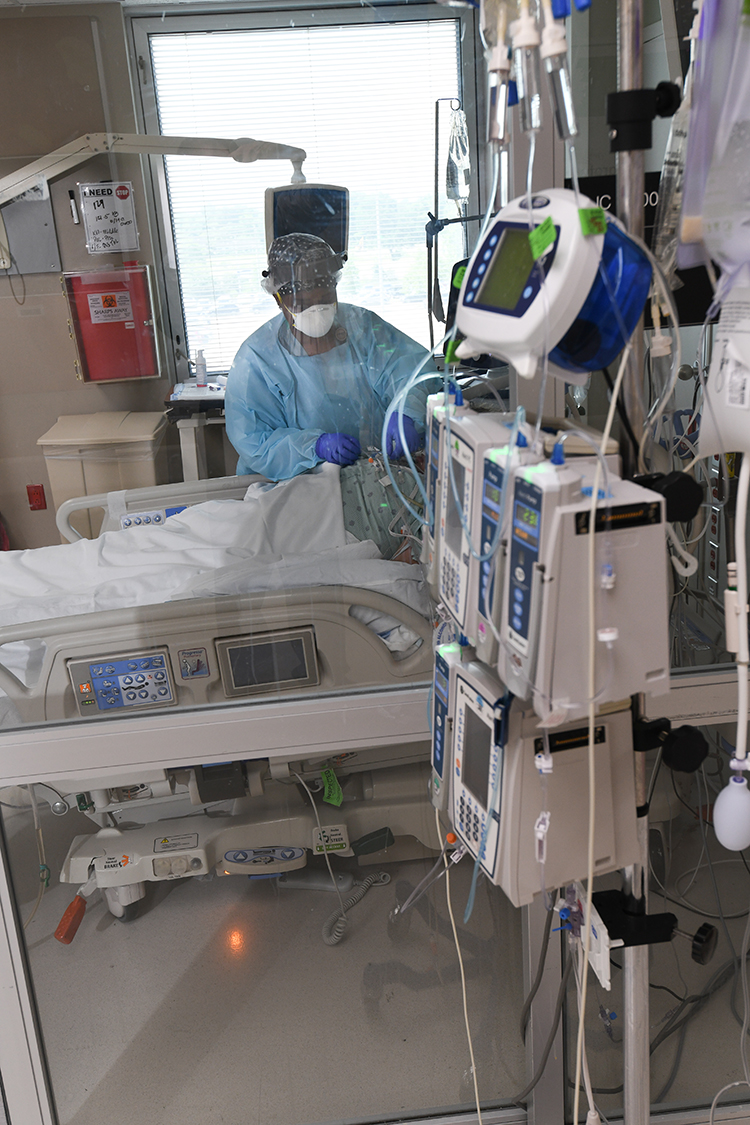 HOUSTON (July 6, 2020) — Nearly two months after her bout with COVID-19, Kony Chacon enjoys spending time with her newborn daughter and shows no ill effects from the disease that jeopardized her life and that of her unborn child. She credits a century-old treatment of convalescent blood plasma with helping her recover and, ultimately, reunite with her family.
HOUSTON (July 6, 2020) — Nearly two months after her bout with COVID-19, Kony Chacon enjoys spending time with her newborn daughter and shows no ill effects from the disease that jeopardized her life and that of her unborn child. She credits a century-old treatment of convalescent blood plasma with helping her recover and, ultimately, reunite with her family.
Timing worked out for Chacon as the medical team at Harris Health System’s Lyndon B. Johnson Hospital had just received approval in May to begin treating COVID-19 patients with convalescent blood plasma from recovered COVID-19 patients. LBJ Hospital and its medical school partner—The University of Texas Health Science Center at Houston (UTHealth)—are part of the Convalescent Plasma Expanded Access Program led by the Mayo Clinic.
The U.S. Food and Drug Administration designated the program for academic medical centers across the country to investigate the therapy. Because of its new use for this coronavirus, the treatment is only administered to the most seriously ill. Chacon was the first Harris Health patient to receive the treatment—to date, 35 patients have received COVID-19 convalescent blood plasma at LBJ Hospital.
“Essentially you’re giving someone some immunity while their body builds up its own and it kicks in,” says Dr. Pamela Berens, chief of Obstetrics and Gynecology, LBJ Hospital, and professor, Department of Obstetrics, Gynecology and Reproductive Science, McGovern Medical School at UTHealth.
Convalescent plasma is the liquid portion of blood that contains antibodies—the proteins used by the body to fight off infection and disease. For Chacon, the treatment was a ‘miracle.’
“Like I was, I didn’t think I would get cured,” she says. “It felt like I was drowning and would never be able to breathe. The treatment was like a miracle.”
The 22-year-old was only a week away from giving birth when she developed what she thought were pregnancy-related symptoms—swollen feet and a nagging fever. A few days later, however, she developed breathing difficulty.
Doctors at LBJ Hospital suspected COVID-19 and tests eventually confirmed it. Her concern shifted to her unborn child and her husband. Fortunately, both were fine and tested negative for the virus.
Following the healthy birth of her daughter, Chacon’s breathing problems became worse. It was now painful with the virus entrenched in her lungs. Her medical team considered intubating her, but opted instead to administer convalescent plasma therapy and staff waited. It took only a few days, but soon Chacon was breathing better and scans showed less disease in her lungs.
“I can’t say for sure that the plasma therapy is the reason for her rapid recovery, but I believe it helped,” Berens adds.
Chacon was just thankful that after 10 days in the hospital and away from her husband, she was able to finally to go home and hold her baby.
The early success of convalescent blood plasma therapy is why Harris Health partnered with the Gulf Coast Regional Blood Center to encourage people who’ve recovered from COVID-19 to consider donating their convalescent plasma.
“Though still experimental, these donations make this potentially disease-modifying therapy more accessible to treating physicians and COVID-19 patients throughout the greater-Houston area,” says Dr. Esmaeil Porsa, president and CEO, Harris Health System. “As we continue to see severe cases of COVID-19 disease, being able to provide a plasma treatment option to patients in need is a tremendous step forward.”
To learn more about donating blood plasma and to see if you qualify, visit http://www.giveblood.org/about-donating/donation-types/convalescent-plasma/